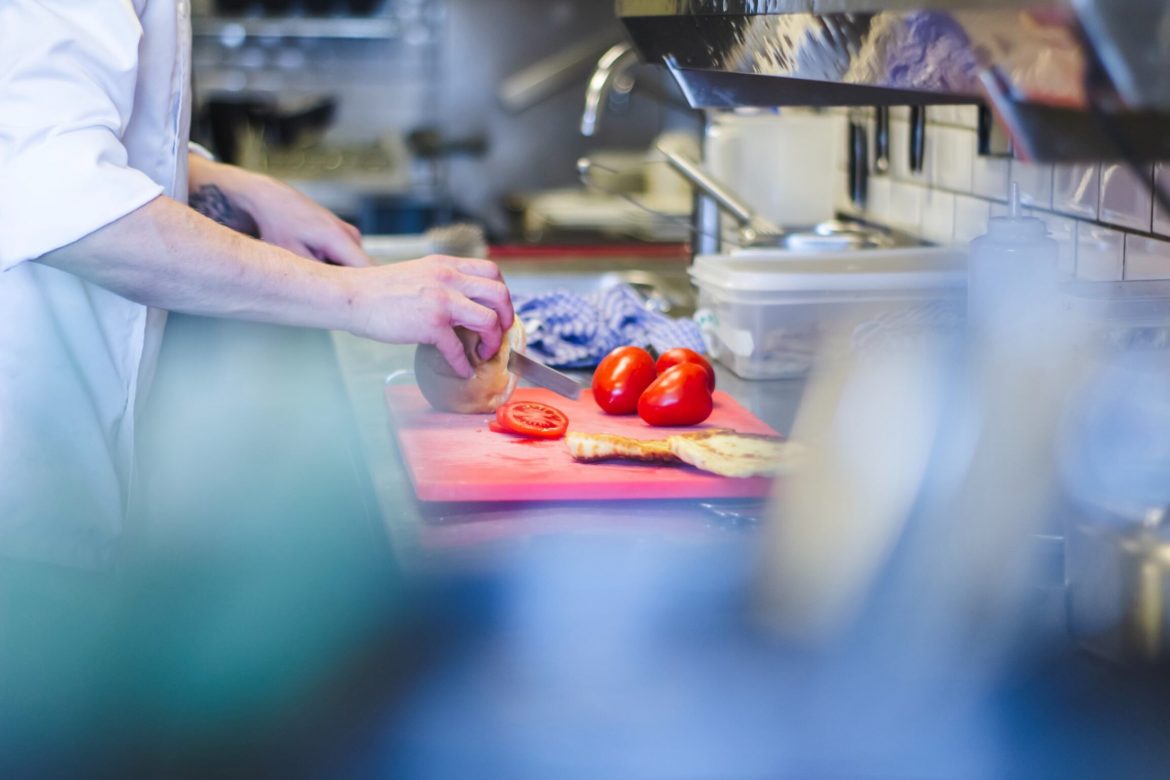Photo Credit: Louis Hansel
Reflections of a summertime line cook
Jackson W. Ranger, Features Editor
I never figured out why I felt fire under the skin of my fingers. Not on the surface, where mild burns usually sit, but deep inside the tip of each digit — like miniature red-hot needles pressed all the way to the bone. Each cut of my chef’s knife shot a fresh lance of pain to my knuckles as I divided blanched carrots into fine juliennes. There was no time to stop and assess the mysterious burns. A thousand other prep items lingered at the edges of my mind: dressing to mix, lobster to dry until my palms turned white, and endless boxes of oblong russet potatoes to slice. After all, burns just came with the task.
The day started like any other midweek double shift: hauling myself through the backdoor ten minutes late with a can of disgusting, sickly-sweet energy drink in one hand and four hours of restless sleep in the other. Always a comrade in exhaustion, the sous-chef stood at a prep table covered end to end in sheet pans of raw chicken, an industrial tub of partially mixed coleslaw perched precariously on the edge.
“Is that Jackson Ranger?” he asked with the same feigned excitement that greeted me every shift we shared. I mumbled a reply and moved on to the punch-in clock, the stack of aprons stashed away in an eternally sweltering upstairs storage room, and the never-quite-sharp-enough knife that awaited me.
By the end of my three and a half months of peak summertime work on the line I could slice, dice, chop, and cube produce faster than ever before — but I was still the slowest in the room by a longshot.
Tuesday, Wednesday, Thursday — a brief Friday break spent in a blurry-eyed haze — and the endless weekend rush. Every day the pattern was punctuated by frantic, messy dinner services and capped off with a quiet ritual of scrubbing every inch of exposed metal in the kitchen.
The men and women who staff restaurant kitchens year-round, day after day, years rolling into decades, are a breed apart from normal humans. They are an eccentric collection of dysfunctional, hilarious, jaded, hypercompetent, and utterly baffling individuals.
Every restaurant is different, and no two kitchens look the same. The characters that populated my little world for a summer were as follows: the chef and his sous where at the top of the hierarchy; a motley crew of sautés, grill cooks, fry masters, oyster-shucking Raw Bar aficionados, salad-slinging garde-manger, and a rotating set of absolutely essential dishwashers stood below them.
My chef, the paterfamilias of the kitchen, was an example par excellence of the bizarre ways people end up in the culinary world. A one-time national fencing championship contender turned electrical engineering dropout; his resume was a fantastical journey through the life of a genuine renaissance man. He was the steady hand that kept the ship afloat. Blessed with a voice that he could project without ever yelling — a subtle but completely crucial distinction — he navigated endless streams of orders without breaking a sweat. Everyone in the kitchen would be dead without him.
Outside our world were the front of house staff — waiters, waitresses, bar tenders, bussers, and managers. They were always around, but fundamentally apart from the going-on of the kitchen. Some cooks spoke with them, trading jokes and offering food. Others hid away on their stations, preoccupied with preparations or too disassociated to notice them. Except for a few particularly charismatic long-time workers, one of whom was certainly at a constant running THC level exceeding any doctor’s recommendation, the general mood once the time to whip up staff meals at the end of a long night was summarized in the best fry cook’s exhausted mumbling: “They’re the bastards who do this to us.”
Of course, they were also the saints that fed us an unbroken stream of refreshments regardless of how busy they were.
The single locale of absolute solidarity between line cook and wait staff was the collection of folding chairs scattered beside a hulking off-set smoker just outside the rear fire exit. Twisting tails of pungent cigarette smoke were the evidence of their temporary union. How else is one meant to escape for a few minutes? There are no set break times in a restaurant kitchen. Instead, the line cook looks forward to the dip in business around three in the afternoon — restlessly following the parabolic cycle of kitchen life. The Smoke Break (capitalized for its sanctity) is the restaurant worker’s one guaranteed means of liberation. For a few brief minutes, each worker is in communion with whoever else managed to escape the line.
Everyone smokes. Everyone drinks. Of course, not everyone, but the spectacle of the thing is so acute and omnipresent that it might as well be all of us. Anthony Bourdain’s description of his first gig as an Executive Chef in Kitchen Confidential: Adventures in the Culinary Underbelly captures the idea perfectly. His restaurant was a pirate ship in the most debauched and chaotic sense: a cesspit of cocaine, hard drinking, chain smoking, and every form of workplace malfeasance under the sun. Bourdain and his cooks put out dishes while cracked out of their minds, only to close out the night with an endless flow of booze. This is a particularly outrageous example — but one will find that the rule holds to one degree or another.
My experience was comparatively tame. Sure, I went home each night with a tall can of hard cider, filling an entire fridge shelf by the end of the summer, and was graced with a “shot” of Jameson on busy nights (although, it could only be described as “shot” by someone whose liver stands eternally at the threshold of toxic shock). It’s also true that my dear friend on the fryolator, whose station stood directly across from mine in a way that made periodic eye contact in the middle of a taxing rush impossible to avoid, gifted me a cigarette box stuffed full of marijuana as a parting gift on my way out the door. This is to say nothing of the methods some employed to maintain focus through seven straight hours of backroom prep. But compared to Bourdain’s escapades, half of which ended with him returning groggily to the waking world on a lonesome park bench an hour before the next workday began, my kitchen was Sunday School.
A quick note on fry cooks. Have you ever contemplated what happens to litres of scalding lard after it’s dirtied by a hundred orders of demonic coconut shrimp? If the poor soul is unlucky enough to work in a place that isn’t blessed with the latest advances in oil-disposal technology, the bubbling mass is filtered and poured into a gigantic metal tube. Every inch of that beast will burn one’s flesh away to bone if one touches any part besides the rubber handle. The fry cook then lugs the lovingly nicknamed “Mailbox of Doom” to a specialized dumpster and heaves the whole thing up and over.
It’s terrifying. Please, thank your local fry cooks for their service.
Cooking on the line in a restaurant is by no means the most difficult job in the world. In truth, it’s pretty straightforward. But the particularly noxious blend of chronic understaffing, long lists of monotonous duties to prepare for service, a wildly uneven workload depending entirely on whether God grants the mercy of a thunderstorm, and the arrogant demands of thoughtless customers place a strain on everyone who enters a commercial kitchen.
The thing is, just about any able-bodied person can enter one. That’s the great glory of the culinary world: it’s a receptacle for people who don’t know where else to go or simply can’t function in any other part of polite society. In the coastal towns of Massachusetts, this openness produces a workforce that ranges from sixty-something Mexican grill cooks who make the best burgers you’ve ever tasted while simultaneously telling you the Titanic was somehow an inside job, to rail-thin American fry guys whose last job was assembling deadly munitions for Raytheon Technologies before the pandemic left them to throw back whiskey while playing Fallout New Vegas for seventeen hours a day.
They were all uniformly insane and I loved them dearly, even the ones I didn’t like. That sort of love is a product of labour performed collectively under immense pressure. Its roots are solidarity, and it persists regardless of any personal feeling toward the individual. When one finds themselves in the weeds and up to their eyeballs in a ceaseless stream of orders, one relies entirely on their fellow workers for support.
There is a certain romance to the restaurant life. One’s labour is transformed, through the application of accumulated knowledge and skills, into an object of fundamental delight. That thrill is a deceptive one that belies the often-exhausting demands of the work, but it is surprisingly easy to forget the truth with time and distance.
I once grumbled to a pantry chef about never working in a restaurant again on an unrelentingly busy day near the end of my time in the kitchen.
He laughed and told me: “That’s what we all say.”
I never figured out why my fingers burned on that sweltering July morning, but my juliennes were sliced perfectly thin. I took pride in those carrots.




